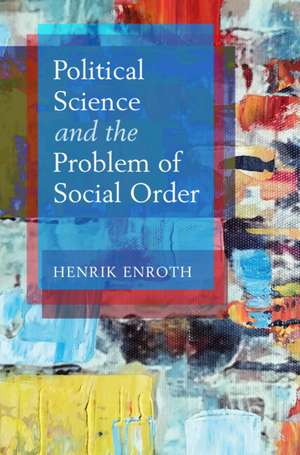Political Science and the Problem of Social Order
Autor Henrik Enrothen Limba Engleză Hardback – 23 mar 2022
| Toate formatele și edițiile | Preț | Express |
|---|---|---|
| Paperback (1) | 282.10 lei 6-8 săpt. | |
| Cambridge University Press – 23 mar 2022 | 282.10 lei 6-8 săpt. | |
| Hardback (1) | 696.31 lei 6-8 săpt. | |
| Cambridge University Press – 23 mar 2022 | 696.31 lei 6-8 săpt. |
Preț: 696.31 lei
Preț vechi: 809.66 lei
-14% Nou
Puncte Express: 1044
Preț estimativ în valută:
133.24€ • 139.11$ • 110.27£
133.24€ • 139.11$ • 110.27£
Carte tipărită la comandă
Livrare economică 04-18 aprilie
Preluare comenzi: 021 569.72.76
Specificații
ISBN-13: 9781316515150
ISBN-10: 131651515X
Pagini: 190
Dimensiuni: 157 x 235 x 20 mm
Greutate: 0.48 kg
Editura: Cambridge University Press
Colecția Cambridge University Press
Locul publicării:New York, United States
ISBN-10: 131651515X
Pagini: 190
Dimensiuni: 157 x 235 x 20 mm
Greutate: 0.48 kg
Editura: Cambridge University Press
Colecția Cambridge University Press
Locul publicării:New York, United States
Cuprins
Preface; 1. The problem of social order and the history of political science; 2. Plurality and unity; 3. Processing community; 4. Bringing community back in; 5. Conflict and consensus; 6. Support for the system; 7. Questioning consensus; 8. Power and participation; 9. The problem of social order and the future of political science; Bibliography.
Recenzii
'What holds society together? This book shows how political scientists across the twentieth century answered this question – and also how, at least sometimes, they avoided confronting it directly, sublimating controversial theories of social order into conceptual presuppositions. Both masterful storyteller and incisive critic, Enroth has a knack for the accessible presentation of ideas in ways that do not flatten their complexity, capturing their strengths and their vulnerabilities with enviable economy, elegance, and wit.' Patchen Markell, Cornell University
'In this lucid and erudite book, Henrik Enroth shows how modern political science has wrestled with the problem of social order from its inception, and how a range of ultimately incoherent solutions to this problem have animated political inquiry ever since. From this Enroth distills a lesson of great value to all political scientists: that social order cannot be taken for granted, but that its creation should constitute a topic of inquiry in its own right.' Jens Bartelson, Lund University
'This book offers a new angle on the discipline of political science. The author argues that, although 'the problem of social order' has been central to debates in political science from the early twentieth century onwards, the centrality of this problem has rarely been recognized as such. Consequentially, political science tends to keep, with relatively minor variations, addressing a problem that cannot be solved. Enroth's arguments are convincingly presented and well argued. A pleasure to read.' Peter Wagner, Universitat de Barcelona, School of Sociology
'Enroth's sweeping panorama is exciting in its intellectual ambition and persuasive in its analytical clarity. It is at once a revisionist history of political science and a probing investigation of contemporary modernity.' Jeffrey Alexander, Yale University
'In this lucid and erudite book, Henrik Enroth shows how modern political science has wrestled with the problem of social order from its inception, and how a range of ultimately incoherent solutions to this problem have animated political inquiry ever since. From this Enroth distills a lesson of great value to all political scientists: that social order cannot be taken for granted, but that its creation should constitute a topic of inquiry in its own right.' Jens Bartelson, Lund University
'This book offers a new angle on the discipline of political science. The author argues that, although 'the problem of social order' has been central to debates in political science from the early twentieth century onwards, the centrality of this problem has rarely been recognized as such. Consequentially, political science tends to keep, with relatively minor variations, addressing a problem that cannot be solved. Enroth's arguments are convincingly presented and well argued. A pleasure to read.' Peter Wagner, Universitat de Barcelona, School of Sociology
'Enroth's sweeping panorama is exciting in its intellectual ambition and persuasive in its analytical clarity. It is at once a revisionist history of political science and a probing investigation of contemporary modernity.' Jeffrey Alexander, Yale University
Descriere
Shows how the problem of social order has shaped concept formation, theory, and normative argument in political science.
